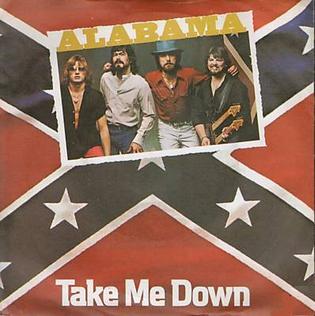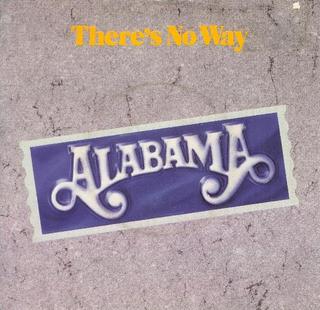
Alabama is an American country music band formed in Fort Payne, Alabama, in 1969. The band was founded by Randy Owen and his cousin Teddy Gentry. They were soon joined by another cousin, Jeff Cook. First operating under the name Young Country and later Wildcountry, the group toured the Southeast bar circuit in the early 1970s, and began writing original songs. They changed their name to Alabama in 1977 and following the chart success of two singles, were approached by RCA Records for a recording deal.
"Christmas in Dixie" is a song by American country band Alabama. It was released as a single in December 1982 from the RCA Nashville compilation album A Country Christmas. The Christmas song celebrates the holiday in the southern United States. This song was included on Alabama's first Christmas album released in 1985 and has since been included on many Christmas compilations in both the country and all-genre music fields. In 2017, Alabama updated the song by re-recording the unplugged version of it for their third Christmas album titled American Christmas which celebrated its 35th anniversary when they first released the song in 1982. It is the only song credited solely to the four band members, and the one of only two songs to feature a songwriting credit for drummer Mark Herndon.

Christmas is the first Christmas album by country band Alabama. The album was released on RCA Nashville in 1985. It was certified double platinum for shipment of 2 million units by the Recording Industry Association of America on July 11, 1996. Since 1991 when SoundScan started to collate sales data, 515,300 copies have been sold in the United States.

American country music band Alabama has released 26 studio albums, including 20 recorded for RCA Records. Alabama also charted 77 songs on the Billboard Hot Country Songs charts, of which 32 reached number one. The band's longest-lasting number one was "Jukebox in My Mind", which spent four weeks at that position in 1990. Several of the band's early-1980s releases also crossed over to the Billboard Hot 100 and Hot Adult Contemporary Tracks charts, including "Feels So Right", "Love in the First Degree", "Take Me Down", and "The Closer You Get", all of which reached top 40 on the Billboard Hot 100.
"Tennessee River" is a song written by Randy Owen, and recorded by American country music band Alabama, of which Owen is the lead vocalist. It was recorded in April 1980 as the third single from the album My Home's in Alabama. The song was the group's first No. 1 song on the Billboard magazine Hot Country Singles chart.

"Take Me Down" is a song recorded by American country music band Alabama. It was released in May 1982 as the second single from Alabama's album Mountain Music.
"The Closer You Get" is a song written by J.P. Pennington and Mark Gray and recorded by American band Exile in 1981. The song was most notably covered by American country music band Alabama and released in April 1983 as the title track and second single from the album The Closer You Get....

"There's No Way" is a song written by John Jarrard, Lisa Palas and Will Robinson, and recorded by American country music band Alabama. It was released in January 1985 as the first single from the band's album 40-Hour Week.
"Can't Keep a Good Man Down" is a song written by Bob Corbin, and recorded by American country music band Alabama. It was released in August 1985 as the third and final single from the band's album 40-Hour Week.

"Why Me" is an American country and gospel song written and recorded by American country music singer and songwriter Kris Kristofferson.

"Hungry Eyes" is a song written and recorded by American country music artist Merle Haggard and The Strangers. It was released in February 1969 as the first single from the album A Portrait of Merle Haggard. The song was one of the most famous of his career.
"Hello Walls" is an American country music song written by Willie Nelson and first recorded by Faron Young. It was number one on Billboard's country chart for nine weeks in 1961 and spent 23 weeks on the chart. It peaked at number 12 on the pop chart and was Young's only top-40 pop hit in the United States. Young's recording featured Floyd "Lightnin’" Chance on double bass and The Wilburn Brothers on background vocals.

"Six Days on the Road" is an American song written by Earl Green and Muscle Shoals Sound Studio songwriter Carl Montgomery, made famous by country music singer Dave Dudley. The song was initially recorded by Paul Davis and released in 1961 on the Bulletin label. In 1963, the song became a major hit when released by Dudley, peaking at #2 on the Billboard Hot Country Songs chart and cracking the Top 40 (#32) on the Hot 100, leading to it being hailed as the definitive celebration of the American truck driver.
"Detroit City" is a song written by Danny Dill and Mel Tillis, made famous by Billy Grammer, country music singer Bobby Bare and Tom Jones. Bare's version was released in 1963 and was featured on his album "Detroit City" and Other Hits by Bobby Bare. The song — sometimes known as "I Wanna Go Home" — was Bare's first Top 10 hit on the Billboard Hot Country Singles chart that summer, and became a country music standard.
"We Must Have Been Out Of Our Minds" is a song made famous as a duet by country music singers George Jones and Melba Montgomery. Originally released in 1963, the song became a Top 5 hit on the Billboard Hot Country Singles chart and a country music standard.

40-Hour Week is the ninth studio album from American country music band Alabama. Released in January 1985, the album included three songs that topped the Billboard magazine Hot Country Singles chart and continued the band's dominance during the 1980s. The album peaked at number one on the Billboard Country Albums chart and number 28 on the Billboard 200.

"Right or Wrong" is a jazz ballad from 1921. Composed by Arthur Sizemore and Paul Biese, with words by Haven Gillespie, it is described by the original sheet music as "a beautiful fox-trot ballad."

"The Cheap Seats" is a song by American country music group Alabama, released on April 4, 1994, as the third and final single from their album Cheap Seats. "The Cheap Seats" was written by Marcus Hummon and Randy Sharp, and peaked at number 13 on the Billboard Hot Country Singles & Tracks chart in mid-1994. It also peaked at number 6 on the Canadian RPM Country Tracks.
"Here Comes Honey Again" is a 1971 single by Sonny James written by James and Carole Smith. "Here Comes Honey Again" was the last of sixteen, number one country hits in a row for Sonny James. His next release, his remake of "Only Love Can Break a Heart", would peak at number two on country charts. "Here Comes Honey Again" would stay at number one for a single week and spend a total of fourteen weeks on the country chart.

"Hard Hat and a Hammer" is a song written and recorded by American country music artist Alan Jackson. It was released in May 2010 as the second single from his sixteenth studio album Freight Train, which was released on March 30, 2010.











